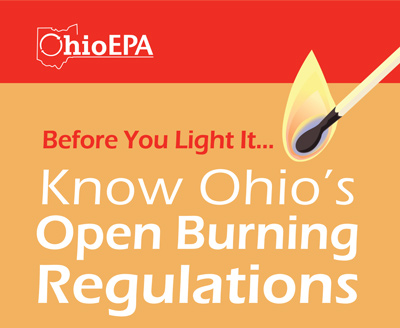Policies & Regulations
Open Burning

Any time you light an outdoor fire it is considered open burning. Some materials may not be burned anywhere in the state at any time.
These are:
- materials containing rubber, grease, and asphalt or made from rubber and asphalt or made from petroleum, such as tires, cars and auto parts, plastics, or plastic-coated wire
- garbage (any waste created in the process of handling, preparing, cooking, or consuming food)
- dead animals
Open burning is not permitted in a restricted area.
Restricted areas include:
- within the boundaries of any municipal corporation
- within corporation limits and a 1,000-foot zone outside any municipal corporation having a population of 1,000 to 10,000
- within corporation limits and a one-mile zone outside any municipal corporation with a population of more than 10,000
A few types of open burning are permitted everywhere, even in restricted areas. Fires must be kept to a minimum size for their intended purpose and shall not be used for waste disposal purposes.
Within a Restricted Area
Permitted burning includes:
- cooking for human consumption (barbecues, campfires, cookouts)
- heating tar
- welding and acetylene torches
- smudge pots and similar occupational needs
- heating for warmth or outdoor workers and strikers
Use common sense. Only use clean wood and restrict the size of the fire so it can be contained in a 55-gallon drum.
Outside a Restricted Area
Outside a restricted area, the following types of wastes generated on the premises can be burned:
- Agricultural wastes such as material generated by crop, horticultural, orlivestock production practices (including fence posts and scrap lumber)
- Landscape wastes such as plant matter including tree trimmings, branches, stumps, brush, weeds, leaves, grass, shrubbery, yard trimmings, and crop residues
- Land clearing wastes such as plant matter which is removed when land is cleared for residential, commercial, or industrial development (may be burned only under certain circumstances with prior written permission from the Ohio EPA).
- Residential waste such as wood or paper products that are generated by one, two, or three-family residences.
*Garbage may not be open burned.
No open burning permitted within 1,000 feet of an inhabited building located off the property where the fire is set. Nor can the fire obscure visibility for roadways, railroad tracks, air fields, or provide a nuisance to the general public.
Open burning is prohibited when air pollution warnings, alerts or emergencies are in effect. Open burning regulations are established by the State of Ohio Air Pollution Control Agency. The regional office is located in Dayton, Ohio, phone (937) 225-4435.
Remember: If the fire creates a nuisance to any person, the fire must be extinguished.


